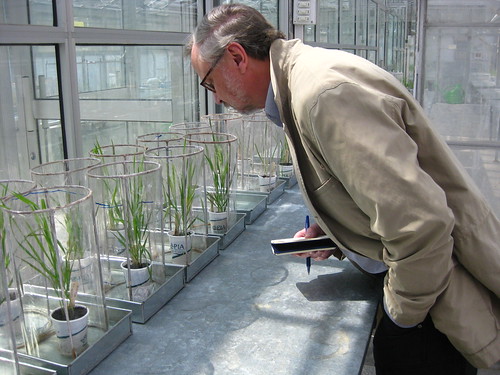
This post is part of the Science Tuesday feature series on the USDA blog. Check back each week as we showcase stories and news from USDA’s rich science and research portfolio.
Plant diseases can easily cross international borders and damage crops in neighboring countries. The good news is that in Pakistan, scientists with USDA’s Agricultural Research Service (ARS) are working toward a solution.
David Marshall, a research leader at the USDA-ARS Plant Science Research Unit in Raleigh, North Carolina, has been collaborating with Pakistani scientists in recent years to prevent losses there from wheat rust diseases including Ug99, a fungal disease that threatens wheat production worldwide. Ug99, which was first reported in Uganda in 1999, has not yet been detected in Pakistan (or in the United States). But it is transmitted by wind-blown spores and has been detected in neighboring Iran. It is widely expected to reach Pakistan in the near future.
Wheat is Pakistan’s most important crop. It is grown on over 22 million acres, is produced by 80 percent of the nation’s farmers and accounts for 60 percent of the daily caloric intake of the average Pakistani, according to the Food and Agriculture Organization of the United Nations. Globally, wheat rusts causes substantial losses each year, and they are particularly devastating to small farmers.
Pakistan is a critical location in global efforts to combat wheat rust in general and Ug99 in particular, says Marshall.
Marshall’s efforts are part of the Wheat Productivity Enhancement Project, which is designed to develop wheat varieties that are resistant to Ug99 and other wheat rusts. Pakistani scientists, along with ARS and other International collaborators, have released 7 new wheat varieties so far. As part of the program, researchers also are monitoring for outbreaks, distributing seed, training researchers on breeding techniques and promoting agronomic practices that enhance production and minimize the threat.
ARS researchers Jodi Scheffler and Brian Scheffler, based in Stoneville, Mississippi, are also part of a collaborative effort in Pakistan to reduce the devastating effects of cotton leaf curl virus (CLCuV). The fly-borne disease originated in Africa, was first reported in Pakistan in 1967 and has since spread to India and China. Pakistan loses more than one million bales of cotton each year to the disease, and it also hits small farmers particularly hard. Thousands of them have participated in training sessions focused on management practices that minimize risks.
The CLCuV research is part of the USDA’s Cotton Productivity Enhancement Program (CPEP). CPEP efforts have improved monitoring, identified new sources of resistance in cultivated cotton and introduced better agronomic practices. Scientists also are developing a laboratory diagnostic test to confirm the presence of the disease.
CLCuV also has yet to be detected in the United States. But as with the Ug99 research, the lessons learned will better equip farmers and crop breeders if the disease is ever detected in the United States.
The programs are funded by USDA and the U.S. Agency for International Development (USAID).

